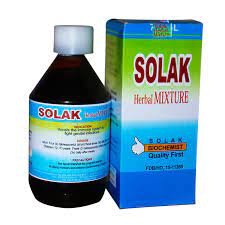Does Solak mixture cure syphilis?. It is said that the Solak mixture cures gonorrhea, syphilis, chlamydia, HIV, hepatitis C, trichomoniasis, yeast infection, and other sexually transmitted illnesses. The validity of these statements is yet to be established. Continue reading this article to find out.
About Herbal concoction known as Solak Mixture

Solak mixture boosts your immune system and aids in the battle against any ailment you may encounter. Genital illnesses, including gonorrhea, syphilis, and yeast infections, are also said to be helped by the supplement.
Where is Syphilis?
Syphilis is a sexually transmitted chronic bacterial illness. Treponema pallidum is the bacterium that causes syphilis.
For hundreds of years, people have been infected, treated, and eventually recovered from syphilis. Treatments for syphilis are so well known that it was once assumed that the disease might be eradicated. In spite of this, the prevalence of syphilis is increasing in a number of demographic groups.
What Are the Risk Factors for Syphilis Transmission?
The bacterium Treponema pallidum causes the infectious illness syphilis, which is often spread via sexual contact. When the skin or mucous membranes have been rubbed raw, the germs might enter the body.
If one person comes into touch with lesions on an infected individual, transmission is most likely to occur. Syphilis is more common in males than in women. Men and women between the ages of 15 and 39 are most often affected by the active illness.
Can Solak mixture cure syphilis
Neither syphilis nor gonorrhea can be cured with the herbal preparation of Solak. Syphilis can’t be cured with Solak herbal combination since it hasn’t been approved by the Ghanaian health authorities or the FDA. This is a complete waste of both your time and your resources. Don’t make your syphilis more complicated. Do not rely only on the Solak combination if you discover an ulcer in your private area.
Syphilis Treatment
Treatment is much easier than diagnosis. A single dose of penicillin heals syphilis in its main, secondary, and early latent stages. Oral antibiotics may be prescribed for two weeks to those who are allergic to penicillin.
It is necessary to provide three injections one week apart to persons who have been identified as being in the late latent stage of syphilis. In this stage, persons who are allergic to penicillin are frequently given antibiotics by mouth.
Treatment with IV penicillin every 4 hours for 10-14 days may be necessary if syphilis has progressed to neurosyphilis. Penicillin injections and oral probenecid for 10-14 days are an option.
Even if a pregnant woman is allergic to penicillin, she must get medication since she has syphilis. In order to undergo desensitization therapy, she must inform her doctor about her sensitivity.
A Jarisch-Herxheimer response may develop 2-12 hours after starting penicillin medication. This response is caused by the dangerous bacterium and might temporarily aggravate prior symptoms. This response, as frightening as it may seem, generally subsides within 24 hours. It is possible to alleviate the symptoms with rest, pain medicines (such as aspirin), and fluids (such as ibuprofen or acetaminophen).
When to See a Doctor
Your doctor should inspect any unusual lesions on your penis or vagina. If you see a rash that doesn’t go away within a few days, you should see a doctor.
Call your doctor immediately if you get any new rash, sore throat, joint swelling, or fever during or after your syphilis treatment.
It’s best to seek immediate medical attention for symptoms including visual changes, discomfort when exposed to bright lights, stiff necks, high fevers, or sudden weakness despite the fact that syphilis may be treated at home by your doctor. Having syphilis may induce a stroke.
